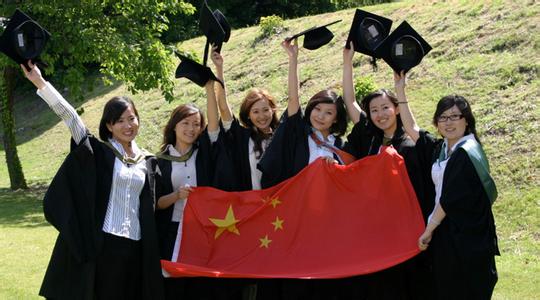As family incomes increase, Chinese students overseas find less need to pursue a major seen as path to wealth
随着家庭收入的提高,中国留学生不必再像往常一样,选择那些被视为赚钱多的专业了
Fewer Chinese students who are going overseas to study are choosing to major in business, according to a report. Last year, 25.5 percent of Chinese university students who chose to study abroad majored in business. In 2010, the proportion was 45.1 percent, according to the Annual Report on the Development of Chinese Students Studying Abroad.
一项报告称,在打算出国留学的学生中,选择商科专业的人越来越少了。根据《中国留学发展报告》,去年中国大学留学生中专业为商科的占25.5%。而2010年这一比例为45.1%。
The report was released by the Center for China and Globalization, a think tank in Beijing, on Wednesday.
这项报告由中国与全球化智库于周三在北京发布。

The report said business is losing its appeal among Chinese students studying in foreign universities.
此报告称,对于中国大学留学生来说,商科专业正在降温。
By comparison, STEM-science, technology, engineering and math-remained at the top among that student population because of its future employment prospects. Meanwhile, some liberal arts disciplines, including international relations, are favored increasingly by Chinese students studying overseas, the report said.
报告称,相比之下,STEM专业(科学、技术、工程和数学)因其未来就业前景广阔,在留学生中仍最受欢迎。同时,包括国际关系在内的一些文科学科逐渐受到了中国留学生的青睐。
Wang Huiyao, director of CCG, said the cooling down of business as a major is related to the economic situation in China.
中国与全球化智库的主任王辉耀称,商科专业的降温与中国的经济形势有关。
"During the past several years, the Chinese economy has been growing at a high speed and business talent has been in great demand, which encouraged many Chinese students to choose business when deciding to study abroad," he said.
“过去几年里,中国经济高速发展,急缺商业人才,这就鼓励了许多决定出国读书的中国学生选择了商科专业,”他说。
"But now, as people are enjoying the fruit of economic development and many Chinese families are getting richer, Chinese students may drop the idea of studying business to pursue material benefits. Instead, they may turn to some majors and disciplines that are less materially beneficial but can arouse their passion and interest, such as liberal arts."
“但现在,人们享受着经济发展的成果,许多中国家庭也越来越富裕,中国学生大概摒弃了学习商科以追求物质利益的想法。他们反而转向那些挣钱虽然少些,但能够激发他们热情和兴趣的专业和学科,比如文科类专业。”
Miao Lyu, executive secretary-general of CCG, said China's current commitment to improve soft power is another factor. "In recent years, China has made efforts to developing the country's soft power and has paid great attention to the development of the liberal arts field," Miao said.
中国与全球化智库的执行秘书长苗绿称,造成这个现象的另外一个原因是当下中国提高其软实力的承诺。“最近几年,中国致力于发展国家软实力,并且十分关注人文科学领域的发展,”苗绿说。
The Trends in International Student Mobility Report, released in 2014 by British education company Quacquarelli Symonds, showed that the discipline of international relations has gradually gained popularity among international students across the world from 2009 to 2014.
英国教育公司夸夸雷利·西蒙兹公司于2014年发布的《国际学生流动趋势报告》显示,2009年至2014年,国际关系学科在全世界留学生中越来越受欢迎。
Wang said a similar interest was also found among Chinese students who went out to study as international students. "A possible reason may be that the interest in relations between countries is growing, as an increasing number of Chinese people have been making trips to other countries in recent years," he said.
王辉耀称,中国留学生近年来也对国际关系学科越来越感兴趣。“可能是因为近些年来到国外旅游的中国人越来越多,因此留学生对国家间关系的兴趣也在增长,”他说。


